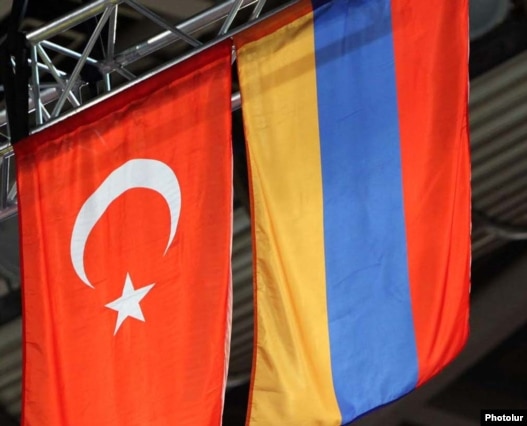 Armenia — Turkish and Armenian flags fly alongside each other during an international sporting event in Yerevan, undated.
Armenia — Turkish and Armenian flags fly alongside each other during an international sporting event in Yerevan, undated.
Turkey will not stop linking the normalization of its relations with Armenia to a Nagorno-Karabakh settlement, a retired Turkish army general who was involved in Turkish-Armenian reconciliation initiatives said on Thursday.
Turkish leaders have repeatedly stated that Turkey’s parliament will not ratify the U.S.-brokered protocols until a breakthrough in the long-running Armenian-Azerbaijani peace talks. A leading member of the ruling Justice and Development Party (AKP) reaffirmed this stance during a recent visit to Yerevan.
“It may not look rational from the Armenian point of view, but Turkey values highly its relations with Azerbaijan,” said Erguvenc. “That can not change easily without having a solution to the Karabakh issue.”
“You just can’t deny the Azeris the support that they deserve in our view,” he said. “Their country is occupied to a considerable extent. Quite a number of people are suffering from this situation. So, of course, we feel committed to support them.”
Asked whether Ankara could drop the Karabakh linkage, rejected by Yerevan, anytime soon, Erguvenc replied: “I don’t think so.” This policy enjoys strong public support in Turkey, he said.

Armenia — Armenian and Turkish media professionals and retired state officials meet in Yerevan, 25 March 2010.
The retired air force general spoke to RFE/RL on the sidelines of a Turkish-Armenian seminar held in Yerevan by the Eurasia Partnership Foundation in collaboration with the Global Political Trends Center (GPoT), an Istanbul-based think-tank. The two-day event brought together former government officials and prominent media figures from the two neighboring countries.
Erguvenc, who currently sits on GPoT’s advisory board, had headed the intelligence department at Turkey’s powerful National Security Council and a planning division at the Turkish army’s General Staff before retiring from the military in 1992. He was also a member of the former Turkish-Armenian Reconciliation Commission (TARC), a panel of retired diplomats and public figures that was set up in 2001 at the U.S. State Department’s initiative. TARC repeatedly called for the unconditional establishment of diplomatic relations between the two states and opening of their border before being disbanded in 2004.
Erguvenc insisted that the Turkish-Armenian normalization process has not failed and will eventually end in success if both sides stay “forward-looking.” “At least, the Turkish government is very much interested in remaining on the positive track,” he said. “They have a declared policy of ‘zero problems’ with neighbors and they want to stick to it.”
“An opening in the Karabakh question would improve the situation tremendously,” he added.
Yalim Eralp, a retired Turkish ambassador also attending the Yerevan seminar, similarly stressed the importance of Karabakh peace for the Turkish-Armenian rapprochement. “When you get a new friend, you can’t lose an old one,” he said.
Armenian leaders argue that neither protocol makes any mention of the Karabakh conflict and that both agreements should therefore be ratified unconditionally. The United States and the European Union have likewise urged the Turks to honor the deal “without preconditions and within a reasonable timeframe.”
“Turkey places its relations with Azerbaijan above Turkish-Armenian relations,” David Hovannisian, a retired Armenian ambassador and another former TARC member, complained during the discussion.
Hovannisian also made the point that the publics in Armenia and Turkey are “much more prepared for the normalization” than the two governments.
Eralp seemed to agree, saying that both civil societies should continue to “press” their governments. “But we have to use that pressure cleverly,” he cautioned.


Leave a Reply